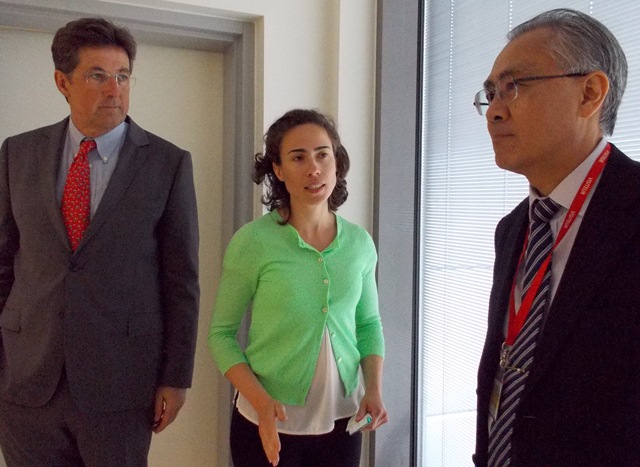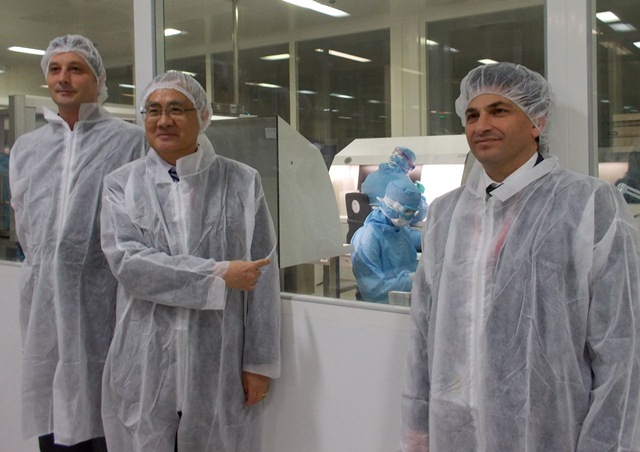
What is “service”? (No.14)
20th of April 2015
Last week (the week of May 13) was a week in which I was forced to think about what “service” is.
First of all, from April 13, the “Hannover Messe”, the well-known International Trade Fair for Industrial Technology was held, with visits from the German Chancellor Merkel and Prime Minister Modi of India, and it was also quite the news here in Brussels. The most talked about topic there was the “Fourth Industrial Revolution”.
The First Industrial Revolution refers to the dramatic expansion of productivity from the late 18th century onwards through the use of the steam engine and hydraulic engine, which began in the United Kingdom. The Second Industrial Revolution points to the introduction of a labour-intensive mass production system using electric power in the early 20th century. Then, the Third Industrial Revolution began in the 1970s, by means of partial automation of the production process through the introduction of electronic technology.
Now, what could the "Fourth Industrial Revolution" be? It is the full-scale utilization of the internet and AI (artificial intelligence) to enhance the efficiency of the production process in a revolutionary way. In layman’s words, if the Third Industrial Revolution was to introduce robots to perform simple tasks in the production process, in the Fourth Industrial Revolution robots will automatically produce a different product from the same production line in order to respond to the latest trend in the demand. Such attempts are referred to as "Industrie 4.0" in Germany and commonly called "industrial internet" in the United States. I have heard that a similar way of thinking has been introduced already in Japan as well, which, one might say, lines up with ideas such as a Smart Grid for power supply, actively discussed in Japan. This is the field, in which I would like Japan, having excellent technical capabilities and providing a variety of services, to make a difference.

Just when I was thinking this, I had last week the opportunity to visit the Research & Development and production site of UCB, an international pharmaceutical company in Belgium. I met with a female Japanese researcher who has been active there for nearly 20 years. I felt proud, and at the same time it was a somewhat interesting experience.
 At UCB’s pharmaceutical research and development, production, and even packaging departments, considerable mechanization has been introduced. Among them, I was shown the "Custom-made for Japan" packaging line of a certain product. What is so custom-made about it? In order to make a nicer packaging, there is less automation of the production process compared to the new line. In other words, there is more manual work, so the previous production line is used only for products for the Japanese market. According to the explanation, the products exported to Japan using the latest production line were quite regularly returned due to, for example, small dents or scratches on the box. In order to improve this situation, manual work was therefore reintroduced. By the way, the productivity is half of that of the newest production line. Furthermore, there doesn’t seem to be any problems in other countries with the products produced with the latest line.
From the company’s side, they took the trouble to explain to me that it is a proof of the fact that the company is attentive to the needs of Japanese consumers. In the case of products that require a high accuracy such as pharmaceuticals it is a matter of course, but having just heard about the “Fourth Industrial Revolution” and the spectacular improvement of production efficiency, although I was thinking that this is an amazing service, I also experienced somewhat complex feelings there.
And finally, I heard another story related to service. This is an experience my wife had in the same week. It happened when she was returning from the city centre by taking the same bus she always does. The bus left from a certain bus stop and was coming near an intersection. Although the bus was not yet at the next bus stop, it stopped then and there and the doors opened. Then, an elderly man, wielding a cane, waved to the driver as he got off. That place must have been the best place to get off for him. From the previous bus stop until the intersection it was indeed considerably uphill, appearing a bit hard for an elderly person.
In the countryside in Japan one might be able to see a scene like that from time to time, but in the capital I think it is not quite the case. My wife seems to have been impressed by this kind of Belgian-style “custom-made” service.
Certainly, this is something which can be linked to what I mentioned earlier about UCB’s packaging line for Japan. This may be an example of Belgium’s broad-mindedness. At the same time, I hope that the Fourth Industrial Revolution, rather than to lose such a flexible service, will continue to progress in a direction that allows for a more meticulous custom-made service. This is perhaps "Human Innovation" as it essentially should be.
|

